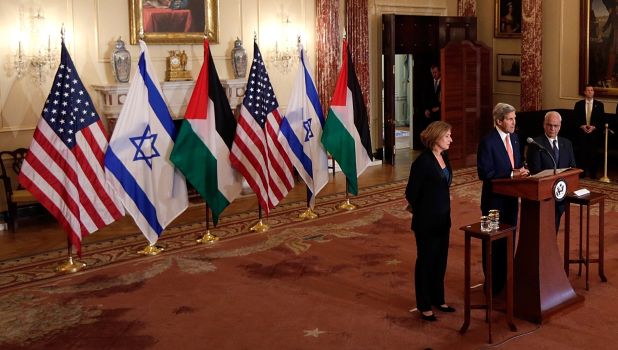During the first three rounds of the current US-sponsored peace talks between the Palestinians and Israel, Palestinian president Mahmoud Abbas has been clear that “every topic is up for negotiation” and that any agreement coming out of these meetings would signal an end to the conflict forever. Tzipi Livni, the top Israeli official at the talks, has promised that her country will make “dramatic decisions” by the end of the process.
Past experience would tell us that the grand promises, high hopes and goodwill of today won’t add up to real breakthroughs tomorrow. This time, however, one new variable must be considered: these are the first substantive peace talks between Israel and an Arab party since the start of the Arab Spring.
The Arab Spring has not created an unprecedented window for peace. The historic baggage, intractable differences and domestic politicking on key issues—security, borders, settlements, refugees, Jerusalem—that have plagued Arab–Israeli peacemaking efforts in the past remain as potent as ever.
Yet the Arab Spring and its consequences have not made reaching a peace deal, at least in the Israeli–Palestinian context, impossible or even more difficult to achieve, as many have suggested.
It is true that the political turmoil and uncertainty born of the Arab Spring is not (as former US secretary of state Henry Kissinger has argued) in itself conducive to peacemaking. But for every obstacle it has thrown in the way of peace, opportunities and incentives for finding an agreement have also been created.
This was clearly demonstrated on the Palestinian side at the height of popular protests across the Arab world in 2011. Abbas immediately looked to co-opt the Arab Spring to promote the Palestinian struggle for statehood and to divert attention from societal ills by claiming that the “Palestinian Spring would be a spring of peaceful struggle that will reach its goal.”
However, the Arab Spring has never been about the politics of the Arab–Israeli conflict—even for Palestinians. In its first two years it was about jobs, political rights and a citizen’s stake in the future of society. For example, following initial anti-Israel demonstrations in the summer of 2012, subsequent mass protests in the West Bank focused almost totally on the socio-economic grievances common to the region.
Even now, as the early hopes for the Arab Spring give way to sectarian violence, domestic political power struggles and civil war, the Arab–Israeli conflict is not a major factor. Indeed, the Arab Spring has shattered the long-held view that there can be no profound structural change inside the Arab world until the Arab–Israeli conflict has been settled.
Recent events have also shown that the Arab Spring does have implications for Israel and its relationship with the Arabs that are not inimical to peace.
In Egypt, for example, the Arab Spring resulted in the overthrow of Israel’s closest Arab strategic partner, Hosni Mubarak, the rise to power of the Muslim Brotherhood, and a military-led counter-offensive against Islamists that has left the country in a state of emergency.
All this has served to remind Israeli policymakers of the need to focus on security over diplomacy and to avoid risky concessions for peace at a time of upheaval. But events in Egypt have also underscored the durability of the peace agreement with Cairo, even during the Muslim Brotherhood’s short time in power.
The situation in Egypt has also thrown out a challenge to Israel. The country cannot claim to be a legitimate, never mind major, regional player if it chooses to opt out of the crisis and dismiss the Arab Spring as a matter for the Arabs alone.
Instead, it needs to look to contribute to regional stability in one area where it can—peacemaking. There appears to be an increasing awareness of this among Israeli policymakers. Prime Minister Benjamin Netanyahu initially argued that his government should take no risks for peace in response to an Arab Spring that was “Islamic, anti-Western, anti-liberal, anti-Israeli and anti-democratic.” But he has gradually come to realize that Israel needs to be proactive in pursuit of peace in order to protect its interests and maintain its role in the region.
From an Israeli perspective, the ongoing crisis in Syria appears at first to provide a poor incentive for prioritizing peace. The Syrian civil war has increased insecurity and instability on Israel’s borders. It has led to a rise in sectarian violence in Lebanon and has placed further socioeconomic and political pressure on Jordan. Bad as all this is, the Syrian civil war has also greatly weakened the Iran-led anti-Israel axis in the region. This bolsters Israel’s strategic security and its confidence—both prerequisites for concessions in other quarters.
Similarly, the ongoing strife in Syria has made the conclusion of an Israeli–Syrian peace deal impossible for the foreseeable future. This makes an agreement with the Palestinians even more important for an Israeli government isolated regionally and under pressure from an international community increasingly pessimistic over the chances of a “two-state” solution to the conflict.
The Arab Spring has caused extreme uncertainty and instability across the region, but many significant breakthroughs in Arab–Israeli peacemaking—Sadat’s visit to Jerusalem in 1977, the secret Oslo meetings of 1993—have come during periods of flux.
In the final account, peace requires both Israelis and Palestinians to believe that the time is right to make the concessions and compromises necessary to end their conflict. If they refuse to do so and the current negotiations fail, it will not be the fault of the Arab Spring or its consequences.
The counterpoint to this article can be read here.
